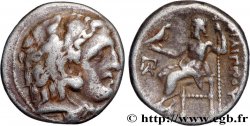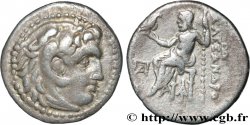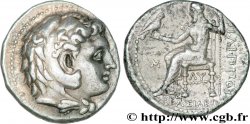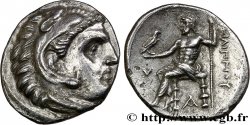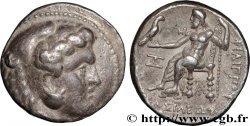bgr_267396 - MACEDONIA - MACEDONIAN KINGDOM - PHILIPP III ARRHIDAEUS Hemidrachme
недоступный.
Товар уже продан в нашем интернет-магазине (2013)
Цена: : 650.00 €
Товар уже продан в нашем интернет-магазине (2013)
Цена: : 650.00 €
Тип Hemidrachme
Дата: c. 323-317 AC.
Монетный двор / Город: Marathos, Phénicie
Металл: silver
Диаметр: 13,50 mm
Ориентация осей монеты: 11 h.
Вес: 2,02 g.
Редкость: R3
Комментарии о состоянии
Exemplaire sur un petit flan ovale, bien centré des deux côtés avec les grènetis visibles. Très beau portrait d’Héraklès de style fin bien venu à la frappe. Joli revers à l’usure superficielle. Jolie patine de collection ancienne avec des reflets dorés
Ссылки в каталоге: :
Происхождение:
Cet exemplaire provient de la vente Münz Zentrum 68, 25 avril 1990, n° 101 et de MONNAIES 51, n° 95
Лицевая сторона
Аверс: легенда: ANÉPIGRAPHE.
Аверс: описание: Tête imberbe d'Héraklès à droite, coiffée de la léonté, nouée sous le cou ; grènetis ciruculaire perlé.
Обратная сторона
Реверс: Описание: Zeus aétophore assis à gauche sur un trône avec dossier, les jambes parallèles, nu jusqu'à la ceinture, tenant un aigle posé sur sa main droite et un long sceptre bouleté de la gauche ; dans le champ à gauche, un monogramme, un autre sous le trône ; grènetis circulaire perlé.
Реверс: легенда: FILIPPOU/ (NUA)/ (ARi).
Реверс: перевод: (de Philippe).
Комментарий
Semble de même coin de droit que l’exemplaire du British Museum (MP., p. 434, n° P. 166b, pl. CXLI, provenant de Rollin en 1910. Le British Museum possède une seconde hemidrachme provenant de la collection Stirling en 1854).








 Cообщить об ошибке
Cообщить об ошибке Распечатать страницу
Распечатать страницу Отправить мой выбор
Отправить мой выбор Задать вопрос
Задать вопрос Consign / sell
Consign / sell
 Информация
Информация